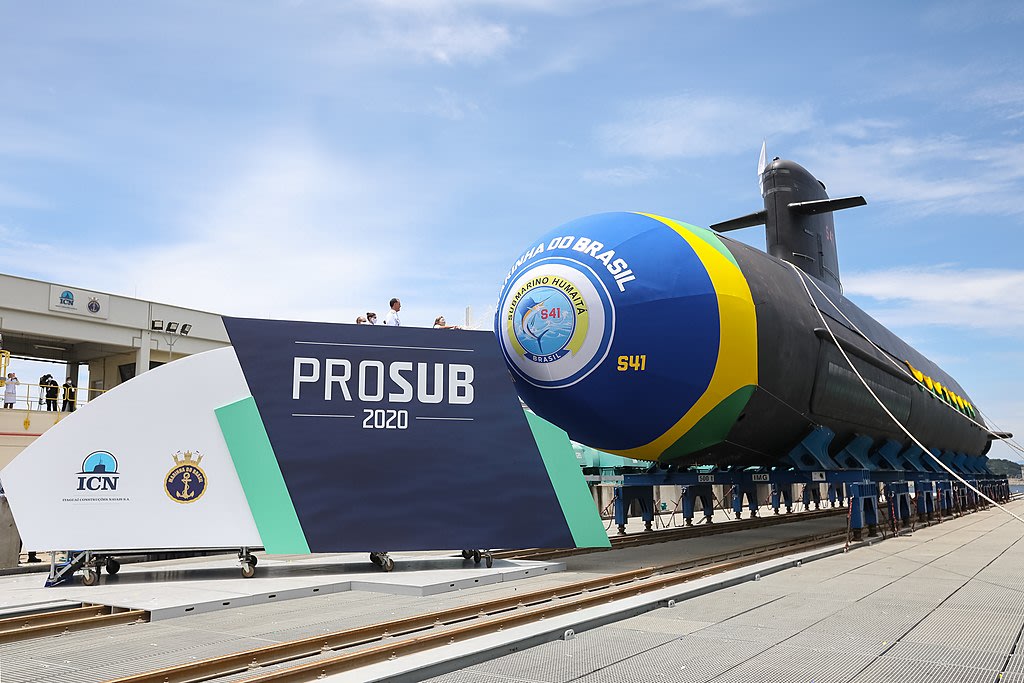The Riachuelo Class Submarines: The Brand New Brazilian Subs
Vessels will be used in the defense of Brazilian aquatic borders

Owner of an extensive coastline, Brazil has about 95% of foreign trade moved by waterways. In addition to strategic trade routes, highly valuable mineral deposits are located in maritime territories.
According to Admiral Almir Garnier, commander of the Navy, the patrolling and defense of Brazilian aquatic borders are about to receive the reinforcement of four new submarines and Tamandaré-class frigates.
According to the commander, the first submarine will be received by the Brazilian fleet by the end of this year, while the three other vessels will be completed during 2022. The construction of submarines is considered a strategic area by the Brazilian government, as it drives industrial and technological knowledge, in addition to providing training and ostensible patrolling in the immense Brazilian coast.
“This is the Amazônian management system. All this Brazilian heritage needs a management and coordination system that sees everything from above, from the side, from below”, said the Navy commander in an interview on the program A Voz do Brasil.
Almir Garnier informed that one of the Navy's roles is to define the Brazilian maritime borders through the presence of ships and contingents in constant vigilance, which monitor and defend national interests in accordance with current legislation.
The Riachuelo Class Submarines
The Riachuelo Class is a family of diesel electric propulsion submarines, derived from the French Scorpène-Class submarines, which are under development under the Brazilian Navy's PROSUB program.
Riachuelo Class vessels are larger in length, tonnage and cargo capacity compared to French originals. The Brazilian version has 71.62 meters and 1,870 tons, compared to the 66.4 meters and 1,717 tons of the Scorpènes.
General features
Class: Riachuelo
Displacement: 2,200 t
Tonnage: 1,870 t
Width: 6.2
Length: 71.6 m
Propulsion: 4 diesel engines + 1 electric motor
Speed: 20 knots
Autonomy: 13 000 miles
Depth: 300 meters
Armament: 6 533 mm torpedo tubes
Sensors: 1 TSM 2233 Eledone sonar and
1 TSM 2253 sonar
Armed Forces in the Pandemic
Regarding the Navy's work during the pandemic, Garnier highlighted the logistical support for the distribution of medicines, food, clothing, vaccines and supplies to families in isolated places in the country. “We are completely involved in this [fighting the pandemic]. Our technology center, together with the University of São Paulo (USP), developed and produced respirators, which at the beginning of the pandemic were very critical. We disinfected public places with our germ warfare capacity team, we carried out vaccination activities across the country, where access is more difficult,” he said.
The squadron admiral also recalled that the Navy was involved in the distribution of food to truck drivers at the beginning of the pandemic, when most commercial establishments on federal highways were closed.
Ships of hope
Regarding the action of the so-called ships of hope - Navy vessels that take social actions to remote communities -, Garnier informed that one of the Navy's roles is to bring citizenship and social assistance to the population.
"Often these remote families, in very remote locations in our territory, the only doctor, the only dentist that they see in their entire life is possibly a Navy doctor."
According to the military, the ships of hope make 35 thousand services a year, in around 600 communities. “Indigenous people, Brazilians of various descent – all are treated with the same affection”, he added.
Battle of Riachuelo
The commander also recalled the so-called magna date of the Brazilian Navy, June 11, the day of the Naval Battle of Riachuelo. Held in Corrientes, Argentina, the battle was one of the decisive conflicts of the Triple Alliance War, which took place between 1864 and 1870.
“It's important to say that we don't celebrate the battle itself, which is always painful. We lost a lot of lives. What we celebrate are the moral values that arise in times of adversity. These are the heroes we worship: Admiral Barroso, sailor Marcílio Dias, midshipman Greenhalgh. Young people full of dreams who left their lives to defend our flag, our sovereignty,” said Admiral Garnier.
“These moral values that those patriotic Brazilians lent us are still present today. They are sailors who, in times of adversity, outdo themselves and go ahead. That's what we celebrate, it's these examples that we don't want to die in our sailors and in the Brazilian people”, he concluded. (Source: Agencia Brasil)
About the Creator
Borba de Souza
Writer and business founder that enjoys writing about history and culture.
Founder of Small Business Hacks https://www.youtube.com/c/SmallBusinessHacks and https://expatriateconsultancy.com. My published books: https://amzn.to/3tyxDe0






Comments
There are no comments for this story
Be the first to respond and start the conversation.